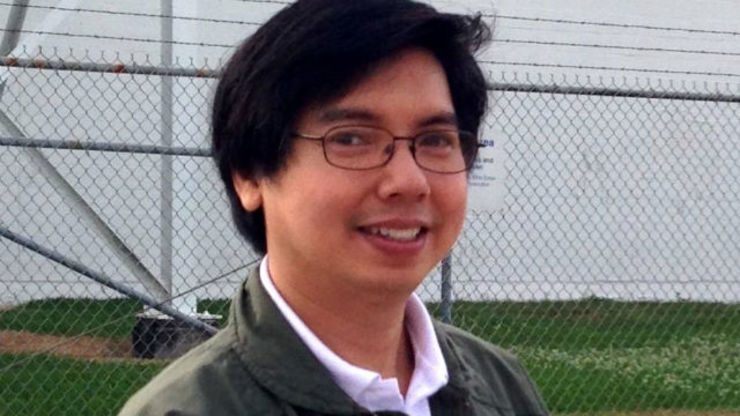SUMMARY
This is AI generated summarization, which may have errors. For context, always refer to the full article.

Can you imagine the smell of chicken adobo in outer space?
“Adobo is possible to prepare in a future space habitat, since it can be done with freeze-dried chicken or pork but not the food I miss the most: rellenong bangus (stuffed milkfish)!” says Filipino NASA scientist Apollo Arquiza.
Arquiza is a scientist for NASA’s Advanced Cookware and Techniques for Food Preparation dubbed as the “cooking project” which may be done on Mars Space Mission in 2030.
When Arquiza’s parents decided to name their son after the famous Apollo Mission, it was almost prophetic. He’s not an astronaut, but close to it.
Arquiza was born in Manila and grew up in Las Piñas. He studied at the Philippine Science High School, and graduated magna cum laude for his degree in chemical engineering at the University of the Philippines in Los Baños (UPLB). He obtained his masters in the same course at UP Diliman.
Arquiza taught at UPLB’s Department of Chemical Engineering for 12 years before pursuing further studies at Cornell University in the United States. His research in the Philippines was focused on bio-processing and biochemical engineering. Even with little funding, he had done research on designing processes and equipment for the production of biofuels and bioproducts from agricultural crops and residue.
This include the generation of biodiesel and oleochemicals from coconut and waste cooking oils. He designed a bio-reactor for solid-state fermentation to produce amylase from rice bran, an enzyme that breaks down starch into glucose, a step required for the production of biofuels/bioproducts from plant starch like ethanol from corn or cassava.
From Cornell to NASA
Arquiza’s interest in the space exploration program became possible when he was accepted at Cornell’s PhD Program in Biological and Environmental Engineering in 2005.
Professor Jean Hunter of the Biological and Environmental Engineering Department chose him to be a graduate research assistant after a rigid selection process. Arquiza was admitted based on his academic performance and research work. He then started his research on advanced life support for human space exploration.
Arquiza’s work is a part of Dr Jean Hunter’s research on space food studies funded by NASA. It is a part of HI-SEAS (Hawaii Space Exploration Analog and Simulation), a mock Mars simulation environment. The team boarded a zero gravity G-Force 1 space simulator plane in late April to test the effectiveness of a specially constructed space galley. This is the first partial gravity cooking on record. Filipino food is the first thing Arquiza wants to cook in space.
Arquiza’s contributions to the scientific community and space exploration are considerable. Since 2005, he has been involved in various NASA-funded projects such as the Closed-loop Waste Processing Dryer and Enhanced Brine Dewatering which is a project on water recycling for space missions and Production of Electrolysis Purity Water for lunar in-situ resource utilization. These projects seek to improve life support systems in space; from drying of crew laundry, to stabilization of cabin waste and water recovery process.
“The food study (HI-SEAS) and design of cooking equipment for space habitat project ended this year. Professor Hunter and I are currently preparing follow-up and other research proposals for NASA funding,” Arquiza says.
Coming home
Scientific research is a problem in the Philippines, Arquiza admits. “We always lack funds for research projects and procurement or upgrading of scientific equipment. Our country should increase the budget for Research & Development. In 2007, Philippine research and development investment was only 0.09% of our GDP; much lower than Thailand and Malaysia,” he laments.
While Arquiza loves his mother country, a chance to become a US citizen would open many doors for him to pursue further research on human space exploration. For one, he could have more funding sources. He could also work at private space companies like Space X and Sierra Nevada Corporation.
Holding a Filipino citizenship does not deter him from working with NASA assisted-projects. It might pave the way for other Filipino scientists to explore their potentials in space research. Arquiza assures that he will share his expertise with fellow Filipinos by collaborating with research institutions and participating in the Balik-Scientist program.
“I would very much like to work with Filipino scientists in doing research that would have a high impact on the development of our country” he says.
To his fellow Filipino scientists, he says, “ We do research because we are fascinated by the Universe and how it works. We want to share the wonders of the Universe and that is why we teach – to spark the desire for knowledge in everyone. Keep up the good work, even though the hours are long and the financial rewards are small.”
Arquiza says that encouragement and financial support from the government are needed by Filipino scientists. He believes that advancement in science and technology helps the country prosper. The achievements of Filipino scientists must be given importance because they will inspire young Filipinos.
“We are facing formidable problems now and in the future (e.g. climate change, energy and food shortages, environmental degradation), and we need a strong scientific community to find solutions that are appropriate to the Philippines,” he says. – Rappler.com
Add a comment
How does this make you feel?
There are no comments yet. Add your comment to start the conversation.